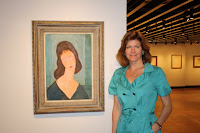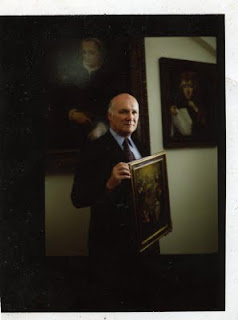 |
| Mathew Taylor (LAPD Art Theft Detail) |
Press Release from the US Attorney's Office for Central District of California
by Thom Mrozek, Public Affairs Officer
LOS ANGELES – A Florida man was arrested this morning pursuant to a federal indictment that alleges he sold paintings stolen from a Los Angeles art gallery, and that he had sold forged artworks to a collector with false claims that they had been painted by esteemed artists.
Matthew Taylor, 43, of Vero Beach, Florida, was arrested without incident this morning by special agents with the FBI. Taylor, who formerly worked as an art dealer, is expected to make his initial court appearance this afternoon in United States District Court in Fort Pierce, Florida.
A federal grand jury in Los Angeles indicted Taylor last week on seven felony charges related to art theft and a long-running fraud that targeted a Los Angeles art collector.
The indictment charges Taylor with defrauding the art collector victim out of millions of dollars by selling him forged art works. Taylor allegedly sold the collector more than 100 paintings – including paintings that he falsely claimed were by artists such as Claude Monet, Vincent van Gogh, Jackson Pollock, and Mark Rothko – for a total of more than $2 million. The indictment alleges that Taylor altered paintings from unknown artists to make them appear to be the products of famous artists, and then sold the bogus artwork to the victim at prices exponentially higher than their actual worth.
To conceal the true nature of the paintings, Taylor allegedly put forged on the paintings and painted over or otherwise concealed signatures from the actual artists. The indictment also alleges that Taylor created and put onto the paintings fake labels which falsely represented that the artworks were once part of prestigious art collections at famous museums, including those of the Museum of Modern Art in the New York and the Guggenheim Museum.
 |
Stolen: "Park Scene, Paris"
$20,000 Lucien Frank painting |
Regarding the alleged art heists, the indictment accuses Taylor of stealing a Granville Redmond painting called “Seascape at Twilight” from a gallery in Los Angeles. Taylor later sold that painting to a different gallery for $85,000, falsely claiming that his mother had owned it for several years. The indictment also alleges that Taylor stole a separate artwork – a painting by Lucien Frank titled “Park Scene, Paris” – from the same gallery in Los Angeles. Taylor was seen several years later in possession of the stolen Lucien Frank painting at a gallery in Vero Beach.
The indictment further alleges that Taylor laundered and transferred across state lines some of the proceeds from his fraud on the collector victim – specifically, $105,000 that Taylor had taken from the victim by selling him four forged paintings in September 2006.
An indictment contains allegations that a defendant has committed a crime. Every defendant is presumed to be innocent until proven guilty in court.
The indictment charges Taylor with three counts of wire fraud, two counts of money laundering, one count of interstate transportation of stolen property and one count of possession of stolen property. The mail fraud charges each carry a statutory maximum sentence of 20 years in federal prison, and the remaining counts each carry a statutory maximum sentence of 10 years. Therefore, if he is convicted of all seven counts in the indictment, Taylor faces a maximum possible sentence of 100 years in federal prison.
Based on evidence collected throughout this case, investigators believe there are additional victims of art fraud related to Taylor’s activities. Individuals who purchased art from Taylor and believe they may have been defrauded should contact the Federal Bureau of Investigation in Los Angeles at (310) 477-6565 or the Los Angeles Police Department’s Art Theft Detail at (213) 486-6940.
The ongoing investigation into Taylor is being conducted by the FBI’s Art Crime Team, the Los Angeles Police Department’s Art Theft Detail, and IRS - Criminal Investigation.
You may read more about this case on the LAPD Art Theft Detail
website.
More information about the $20,000 Lucien Frank painting that is still outstanding may be found
here.
 Elena Franchi,Rape of Europa,Spring 2011,The Journal of Art Crime
Elena Franchi,Rape of Europa,Spring 2011,The Journal of Art Crime
 No comments
No comments
 Elena Franchi,Rape of Europa,Spring 2011,The Journal of Art Crime
Elena Franchi,Rape of Europa,Spring 2011,The Journal of Art Crime
 No comments
No comments












